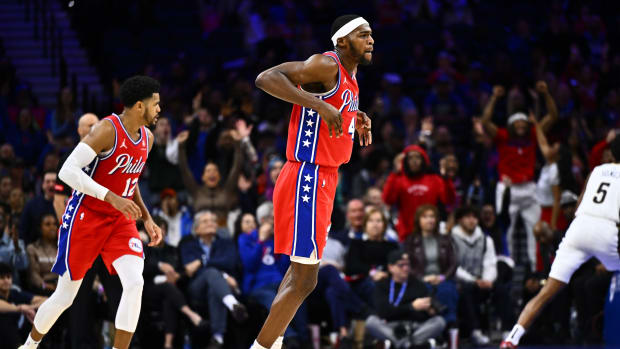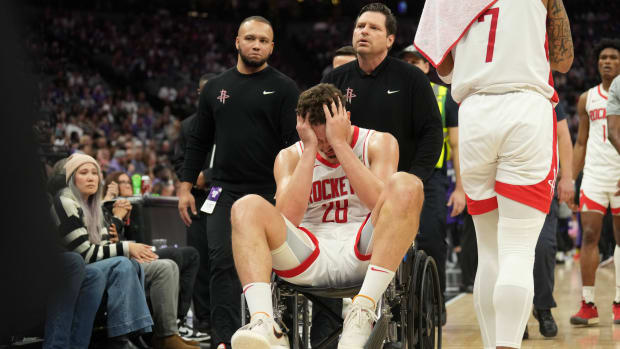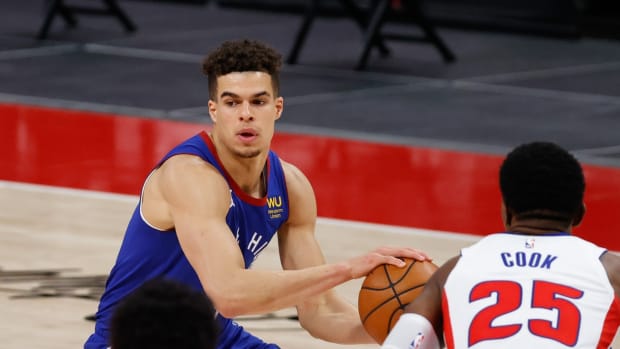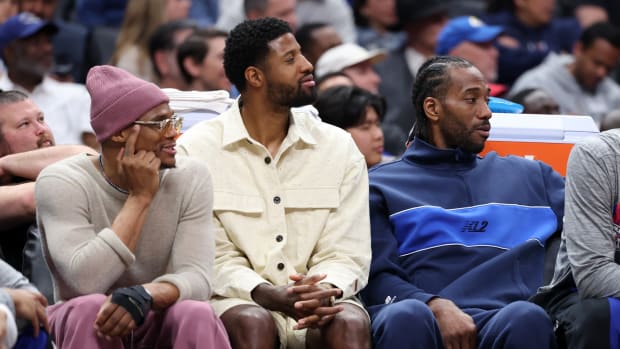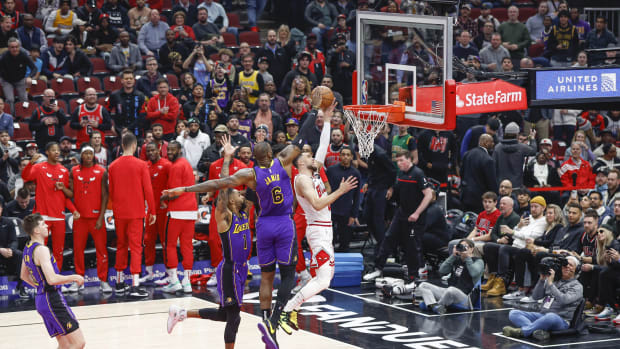Damian Lillard’s playoff struggles threatening to seal Blazers’ fate
Get all of Ben Golliver’s columns as soon as they’re published. Download the new Sports Illustrated app (iOS or Android) and personalize your experience by following your favorite teams and SI writers.
LOS ANGELES — What’s the greatest postseason moment of Damian Lillard’s career? That’s easy: when he drilled a buzzer-beating three-pointer in 2014 to send the Blazers to the second round for the first time in 14 years.
But what’s the greatest postseason moment of Lillard’s career since he sank the Rockets in those 2014 playoffs? That’s a much tougher question, one without any obvious candidates and certainly no great options so far this year.
Roundtable: Does Warriors' 73 wins matter without an NBA title?
The Clippers defeated the Blazers 102–81 at the Staples Center on Wednesday to claim a 2–0 lead as the first-round series shifts to Portland on Saturday. For the second straight game, the Blazers lost by 20 or more points; for the second straight game, Chris Paul (25 points, five assists) badly outplayed Lillard (17 points, three assists) in the series’ most important positional matchup.
Game 2 was a night to forget for Lillard, who committed a game-high four turnovers and missed all six of his three-point attempts on his way to 17 points on 6-for-22 shooting. Lillard was harassed by Paul, trapped by the Clippers’ bigs on the perimeter and shadowed by DeAndre Jordan whenever he tried to drive, and his ugly line set the tone for a futile offensive night for the Blazers, who shot just 34.1% overall and 19.2% from deep.
• SHARP: Playoff problems: All the superstars are on the wrong teams
Unfortunately for Portland, Lillard’s Game 2 performance wasn’t an anomaly. Since his majestic shot against the Rockets, Lillard has been largely ineffective and surprisingly inefficient in the postseason. Two years ago, in the second round, he was held in check by the Spurs, who went on to win the title. Last year, the Grit-and-Grind Grizzlies swallowed up both Lillard and LaMarcus Aldridge with their last gasp. So far this year, Lillard has been an afterthought against the Clippers, unable to string together his signature shooting bursts or even keep the Blazers competitive deep into the fourth quarters.
The damage is starting to add up: In his 12 playoff games since sinking the Rockets, Lillard is now shooting 39.5% overall and just 17.6% from deep. Unsurprisingly, Portland is 2–10 in those games.
Time period | points per game | field goal % | Three-point % |
Regular Season Career Averages | 21.4 | 42.6 | 37 |
Postseason Career Averages | 22.1 | 41.7 | 30.4 |
Since Shot To Beat Rockets | 20.4 | 39.5 | 17.6 |
Through two games, Lillard is right there with Zach Randolph, DeMar DeRozan, Kevin Durant and Isaiah Thomas when it comes to the lowest FG% among the regular season’s high-volume shooters.
Just last week, the Blazers entered the playoffs boasting the NBA’s No. 7 offense, excited to have drawn the Clippers. Now, coach Terry Stotts and company return home with the possibility of a sweep looming, with visions of dozens of bricked jumpers haunting their nightmares.
The list of issues for Portland in this series is a long one. The Blazers don’t have a great individual matchup for Paul, Blake Griffin or Jordan. Their release-valve shooters—Al-Farouq Aminu, Moe Harkless and Allen Crabbe—have been missing in action. Their defense has been shredded by the Clippers’ starters and reserves alike.
Still, the biggest issue is Lillard. While his supporting cast is badly outmatched by the Clippers’ in terms of experience and overall talent, he has had some help. Lillard has had the luxury of cross-matching on defense so that he doesn’t exhaust himself guarding Paul. Stotts also moved Lillard off the ball more often in Game 2, helping free him for more open looks.
What’s more, the Clippers weren’t exactly patting themselves on the back when it came to their defensive work on Lillard.
In hiring Thibodeau, Wolves make coaching move their core deserves
“Honestly we were better in Game 1 defensively,” Rivers said. “They missed shots today. I think that’s what I saw. … I wasn’t happy defensively, honestly. I was happy in Game 1. I was not happy today.”
Paul agreed: “I could have done a better job and not just given [Lillard] all the backdoor layups and dunks and things like that.”
The idea that Lillard is a clutch performer is embedded deep in his carefully cultivated image. The shot against the Rockets was a true brand-maker, the type of indelible moment that gets replayed over and over so often that it comes to symbolize the player for years after the fact. Lillard has embraced this notion of late-game prowess by referencing the “Lillard Time” slogan, complete with a stone-faced wrist-tapping that oozes confidence and moxie.
The SI Extra Newsletter Get the best of Sports Illustrated delivered right to your inbox
Subscribe
But Wednesday saw Lillard staring down a tougher reality: He can’t produce any clutch fireworks if he’s shooting his team out of the game.
“If I would have had it going, [the game] would have come down to the last couple minutes,” Lillard admitted.
Exactly. He didn’t have it going, and the game never had a chance to be tense. Again.
These same options are hanging over what will be a make-or-break Game 3: Lillard gets it going, or the Blazers get to work on their summer plans.
This will only be a series if Lillard makes it one.






























